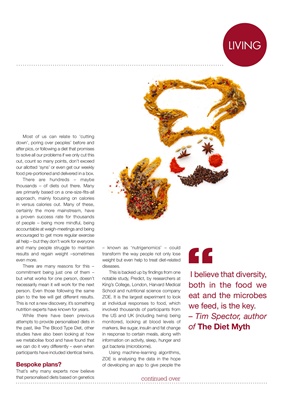
KITLIVING
continued over
Most of us can relate to 'cutting
down', poring over peoples' before and
after pics, or following a diet that promises
to solve all our problems if we only cut this
out, count so many points, don't exceed
our allotted 'syns' or even get our weekly
food pre-portioned and delivered in a box.
There are hundreds - maybe
thousands - of diets out there. Many
are primarily based on a one-size-fits-all
approach, mainly focusing on calories
in versus calories out. Many of these,
certainly the more mainstream, have
a proven success rate for thousands
of people - being more mindful, being
accountable at weigh-meetings and being
encouraged to get more regular exercise
all help - but they don't work for everyone
and many people struggle to maintain
results and regain weight -sometimes
even more.
There are many reasons for this -
commitment being just one of them -
but what works for one person, doesn't
necessarily mean it will work for the next
person. Even those following the same
plan to the tee will get different results.
This is not a new discovery, it's something
nutrition experts have known for years.
While there have been previous
attempts to provide personalised diets in
the past, like The Blood Type Diet, other
studies have also been looking at how
we metabolise food and have found that
we can do it very differently - even when
participants have included identical twins.
Bespoke plans?
That's why many experts now believe
that personalised diets based on genetics
- known as 'nutrigenomics' - could
transform the way people not only lose
weight but even help to treat diet-related
diseases.
This is backed up by findings from one
notable study, Predict, by researchers at
King's College, London, Harvard Medical
School and nutritional science company
ZOE. It is the largest experiment to look
at individual responses to food, which
involved thousands of participants from
the US and UK (including twins) being
monitored, looking at blood levels of
markers, like sugar, insulin and fat change
in response to certain meals, along with
information on activity, sleep, hunger and
gut bacteria (microbiome).
Using machine-learning algorithms,
ZOE is analysing the data in the hope
of developing an app to give people the " I believe that diversity,
both in the food we
eat and the microbes
we feed, is the key.
- Tim Spector, author
of The Diet Myth